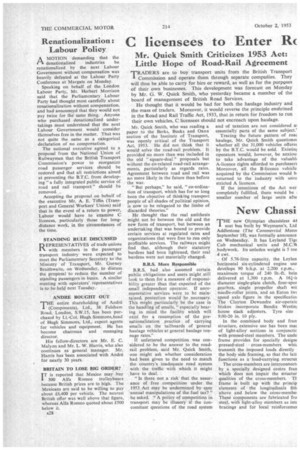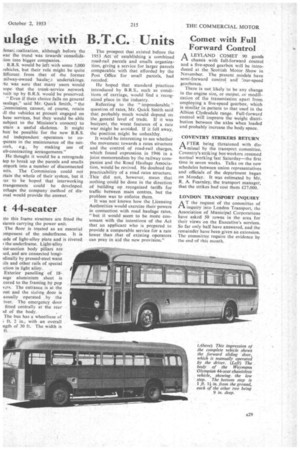C licensees to Enter R( ulage with B.T.C. Units
Page 30

Page 31

If you've noticed an error in this article please click here to report it so we can fix it.
Mr. Quick Smith Criticizes 1953 Act: Little Hope of Road-Rail Agreement
TRADERS are to buy transport units from the British Transport I Commission and operate them through separate compariies. They will thus be able to carry for hire or reward, as well as for the purposes of their own businesses. This development was forecast on Monday by Mr. G. W. Quick Smith, who yesterday became a member of the board of management of British Road Services.
He thought that it would be bad for both the haulage industry and the mass of traders. Moreover, it would reverse the principle enshrined in the Road and Rail Traffic Act, 1933, that in return for freedom to run their own vehicles, C licensees should not encroach upon haulage.
Mr. Quick Smith, who was reading a paper to the Berks, Bucks and Oxon section of the Institute of Transport, was openly critical of the Transport Act, 1953. He did not think that it would solve the road-rail problem. It provided no more than was included in the old " square-deal " proposals but without the co-related road-rail arrangements, particularly as regards rates. Agreement between road and rail was no more likely. in the future than before the war.
"But perhaps," he said, "co-ordination of transport, which has for so long been the objective of thinking transport people of all shades of political opinion, is now to be relegated to the limbo of discarded theories."
He thought that the real antithesis might not be between the old and the new form of transport, but between an undertaking that was bound to provide certain services at regulated rates and organizations that were free to run only profitable services. The railways might find that, although their statutory burdens had been lightened, their real burdens were not materially changed.
B.R.S. More Responsible B.R.S. had also assumed certain public obligations and users might still look to them for a measure of responsibility greater than that expected of the small independent operator. If unremunerative services were to be maintained, protection would be necessary. This might particularly be the case in the handling of smalls, "especially bearing in mind the facility which will exist for a resumption of the prenationalization practice of carrying smalls on the tailboards of general haulage vehicles at general haulage tonnage rates."
If unfettered competition was considered to be the answer to the roadrail problem, said Mr. Quick Smith, one might ask whether consideration had been given to the need to match the country's inadequate road system with the traffic with which it might have to deal.
"Is there not a risk that the assurance of free competition under the 1953 Act may be undermined by easy 'annual manipulations of the fuel tax?"
he asked. A policy of competition in transport may be illusory' if the concomitant questions of the road system and of taxation are not considered a! essentially parts of the same subject.'
Tracing the future pattern of rom haulage, Mr. Quick Smith questionec whether all the 31,000 vehicles offeret by the B.T.C. would be sold. Existim operators would, however, be anxioa to take advantage of the valuabli A-licence rights afforded to purchasers Moreover, all the B-licence vehicle acquired by the Commission would b, returned to the industry with wire strictcd A licences.
If the intentions of the Act wer completely fulfilled, there would be ; smaller number of large units afte JenaOnalization, although before the war the trend was towards cOnsolidadon into bigger companies.
B.R.S. would be left with some 5,000 ;chides, but their role might be quite Efferent from that of the former ailway-owned haular.:" undertakings. r-le was sure that many users would lope that the trunk-service network )oilt up by B.R.S. would be preserved. "Even if their choice falls on general taulage," said Mr. Quick Smith, "the -ommission cannot, of course, retain dl the vehicles at present engaged on hese services, but they would be able subject to the Minister's consent) to etain a useful skeleton. It might hen be possible for the new B.R.S. nd independent operators to coiperate in the maintenance of the network, e.g., by making use of ub-contracting arrangements."
He thought it would be a retrograde tep to break up the parcels and smalls etwork into a number of disconnected nits. The Commission could not ztain the whole of their system, but it as to be hoped that interworking rrangements could be developed. erhaps the company method of disosal would provide the answer. The prospect that existed before the 1953 Act of establishing a combined road-rail parcels and smalls organization, giving a service for larger parcels comparable with that afforded by the Post Office for small parcels, had receded: • He hoped that standard practices introduced by B.R.S., such as conditions cif carriage, would find a recognized place in the industry.'
Referring to the " imponderable " question of rates, Mr. Quick Smith said that probably much would depend on the general level of trade. If it was buoyant, the worst features of a rate war might be avoided. If it fell away, the position might be unhealthy. •
It would be interesting to see whether the movement towards a rates structure and the control of road-rail charges, which found expression in 1946 in a joint memorandum by the railway companies and the Road Haulage Association, would be revived. He doubted the practicability of a road rates structure. This did not, however, mean that nothing could be done in the direction of building up recognized tariffs for traffic between main centres, but the problem was to enforce. them.
It was not known how the Licensing Authorities would exercise their powers in connection with road haulage rates, " but it would: seem to be more consonant with the intentions of the Act that an applicant who is prepared to provide a comparable service for a rate lower than that of existing operators can pray in aid the new provision."




























































































